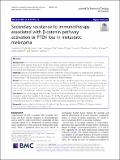Secondary resistance to immunotherapy associated with β-catenin pathway activation or PTEN loss in metastatic melanoma
Author(s)
Trujillo, Jonathan A; Luke, Jason J; Zha, Yuanyuan; Segal, Jeremy P; Ritterhouse, Lauren L; Spranger-Zimmermann, Stefani; Matijevich, Karen; Gajewski, Thomas F; ... Show more Show less
Download40425_2019_Article_780.pdf (3.286Mb)
Publisher with Creative Commons License
Publisher with Creative Commons License
Creative Commons Attribution
Terms of use
Metadata
Show full item recordAbstract
BACKGROUND: While cancer immunotherapies including checkpoint blockade antibodies, adoptive T cell therapy, and even some vaccines have given rise to major clinical responses with durability in many cases, a subset of patients who initially respond subsequently develop secondary resistance to therapy. Tumor-intrinsic mechanisms of acquired immunotherapy resistance are incompletely understood. METHODS: Baseline and treatment-resistant tumors underwent molecular analysis via transcriptional profiling or genomic sequencing for oncogenic alterations and histologic analysis for T cell infiltration to investigate mechanisms contributing to T cell exclusion and acquired resistance to immunotherapy. RESULTS: We describe two patients with metastatic melanoma who initially showed a durable partial response to either a melanoma-peptide/interleukin-12 vaccine or combined anti-CTLA-4 + anti-PD-1 therapy, but subsequently developed new treatment-resistant metastases. In the first case, the recurrent tumor showed new robust tumor expression of β-catenin, whereas in the second case genomic sequencing revealed acquired PTEN loss. Both cases were associated with loss of T cell infiltration, and both pathways have been mechanistically linked to immune resistance preclinically. CONCLUSION: Our results suggest that secondary resistance to immunotherapies can arise upon selection for new oncogenic variants that mediate T cell exclusion. To identify the spectrum of underlying mechanisms of therapeutic resistance, similar evaluation for the emergence of tumor-intrinsic alterations in resistant lesions should be done prospectively at the time of relapse in a range of additional patients developing secondary resistance.
Date issued
2019-11-08Department
Koch Institute for Integrative Cancer Research at MITJournal
Journal of ImmunoTherapy for Cancer
Publisher
BioMed Central
Citation
Trujillo, Jonathan A. et al. "Secondary resistance to immunotherapy associated with β-catenin pathway activation or PTEN loss in metastatic melanoma." Journal of ImmunoTherapy for Cancer 7, 1 (November 2019): 295 ©2019 Author(s)
Version: Final published version
ISSN
2051-1426